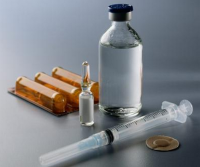








Hepatitis B vaccine is a vaccine for the prevention of hepatitis B, an infection caused by the hepatitis B virus (HBV).
The hepatitis B vaccine is the first anti-cancer vaccine because it can prevent liver cancer. Worldwide, chronic hepatitis B causes 80% of all liver cancer, which is the 9th leading cause of death. Therefore, a vaccine that protects against a hepatitis B infection can also help prevent liver cancer.
History
The hepatitis B virus was discovered in 1965 by acrobat documentDr. Baruch Blumberg who won the Nobel Prize for his discovery. Originally, the virus was called the "Australia Antigen" because it was named for an Australian aborigine's blood sample that reacted with an antibody in the serum of an American hemophilia patient.
Working with Dr. Blumberg, microbiologist Irving Millman helped to develop a blood test for the hepatitis B virus. Blood banks began using the test in 1971 to screen blood donations and the risk of hepatitis B infections from a blood transfusion decreased by 25 percent. Four years after discovering the hepatitis B virus, Drs. Blumberg and Millman developed the first hepatitis B vaccine, which was initially a heat-treated form of the virus.
First Commercial Hepatitis B Vaccine
In 1981, the FDA approved a more sophisticated plasma-derived hepatitis B vaccine for human use. This “inactivated” type of vaccine involved the collection of blood from hepatitis B virus-infected(HBsAg-positive) donors. The pooled blood was subjected to multiple steps to inactive the viral particles that included formaldehyde and heat treatment (or “pasteurization”). Merck Pharmaceuticals manufactured this plasma vaccine as "Heptavax," which was the first commercial hepatitis B virus vaccine. The use of this vaccine was discontinued in 1990 and it is no longer available in the U.S.
Current Recombinant Hepatitis B Vaccines
In 1986, research resulted in a second generation of genetically engineered (or DNA recombinant) hepatitis B vaccines. These new approved vaccines are synthetically prepared and do not contain blood products - it is impossible to get hepatitis B from the new recombinant vaccines that are currently approved in the United States.